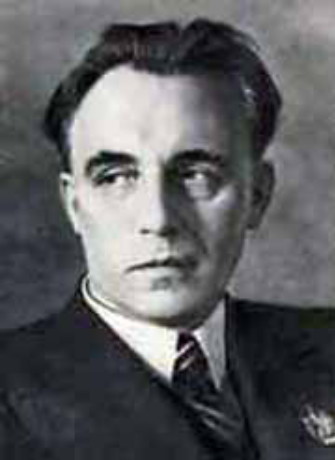Panch, Petro
Panch, Petro [Панч, Петро; Panč] (pseud of Petro Panchenko), b 4 July 1891 in Valky, Kharkiv gubernia, d 1 December 1978 in Kyiv. Writer. He was a soldier during the First World War and during the Ukrainian struggle for independence (1917–20), first in the Army of the Ukrainian National Republic and then with the Bolshevik forces. In the 1920s he was a member of the literary organizations Pluh, Vaplite, and the All-Ukrainian Association of Proletarian Writers. From 1923 he worked in Kharkiv as an editor (1923–32 at the journal Chervonyi shliakh), and from 1934, in Kyiv. During the Second World War Panch worked in the Academy of Sciences of the Ukrainian SSR (now NANU) and at the radio station Radianska Ukraina.
His first collections of novelettes and short stories, Tam, de verby nad stavom (Where the Willows Grow by the Pond, 1923), Solom'ianyi dym (Straw Fire, 1925), and Myshachi nory (Mouse Holes, 1926), dealt with the events of the civil war and the early years of the New Economic Policy in Ukraine. The cycle of novellettes consisting of Z moria (From the Sea), Bez kozyria (Without a Trump), Holubi eshelony (The Sky Blue Echelons, 1926), and Povist’ nashykh dniv (A Tale of Our Days, 1927) describes events in Ukraine from the Revolution of 1905 to the rebuilding of the economy after the First World War and the Revolution of 1917. Povist’ nashykh dniv was one of the first works in Ukrainian Soviet literature on the ‘industrial’ theme. From 1930 the main subject in Panch's works was collectivization, such as in the cycle Mukha Makar (1930–4). Panch is also the author of novels on the history of the revolutionary period, such as Obloha nochi (The Siege of Night, 1935) and Oleksander Parkhomenko (1939), the historical novel Homonila Ukraïna (Ukraine Was Humming, 1954), the memoirs Na kalynovim mosti (On the Viburnum Bridge [ie, In Old Age], 1965), a large number of stories and novels for children, and other works. His works have been published in collected editions of 5 vols (1971), 4 vols (1973), and 6 vols (1981). Panch's realistic style, free of any leaning toward formalism, and his loyalty to the Soviet regime earned him a place among those who had contributed nothing new to literature, but who were nevertheless hailed as the founding creators of Ukrainian Soviet prose.
Ivan Koshelivets
[This article originally appeared in the Encyclopedia of Ukraine, vol. 3 (1993).]
.jpg)

.jpg)